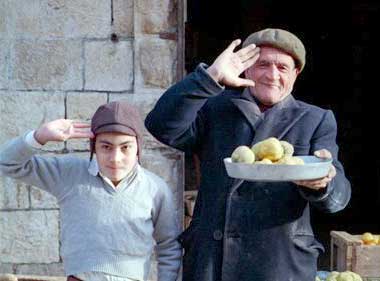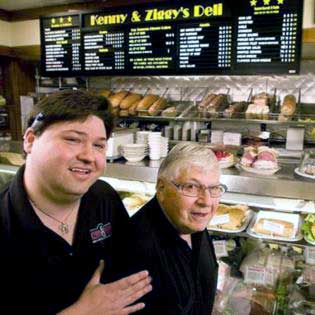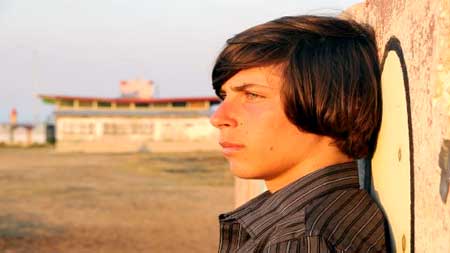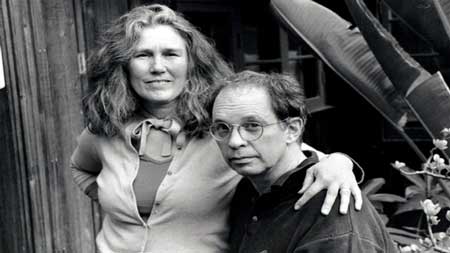Festival
Belmont Studio Theatre, Brattle Theater, Capitol Theatre, Coolidge Corner Theatre, Institute of Contemporary Art, Museum of Fine Arts, West Newton Cinema, among others
November 5 – 17, 2014

Curated by Renen Schorr
Courtesy of Boston Jewish Film Festival
Amy Geller, the energetic and engaging artistic director of the Boston Jewish Film Festival for the past three years, screens 200-250 films annually. This year, she and her team have selected forty-one films to participate in the festival. Some of those naturally have fallen into obvious categories, and, as Geller noted in a recent phone interview, this year’s offerings provided numerous options for collecting some around the theme of parents and children, which provides the content for a series within the series.

Directed by Erik Greenberg Anjou
Courtesy of Boston Jewish Film Festival
Providing a wonderful, organic sense of preparing for the festival as one would curate an art show, Geller notes how she blends an awareness of compelling narrative, of distinctive content, and of the interests of the Boston audience which attends to come up with a list of films to show each year.
This year, for the second year in a row, the Boston Jewish Film Festival is awarding a prize to someone who, as Geller puts it, “strongly believes in cinema and media as ways to build bridges,” even though the recipient may not him/herself be a filmmaker. This year’s award goes to Deborah Nathan, who has brought together Israeli, Palestinian and American teens in visual arts settings as a way of building those bridges between them.

Directed by Marcia Jarmel and Ken Schneider
Courtesy of Boston Jewish Film Festival
Among the featured entries in this year’s festival are Deli Man, a feature length documentary about Ziggy Gruber, who runs a well known Jewish deli in Houston, Texas, and which touches upon American deli-dom in general; Transit, a documentary about Filipino workers in Tel Aviv, surely the only film out there in Hebrew, English and Tagalog; An Apartment in Berlin, a documentary about young Israelis taking up residence in the bustling and artistically energetic German capital in recent years; Havana Curveball, a sweet documentary about a Bar Mitzvah boy who gets hooked on the idea of sending baseball equipment to Cuba, where his grandfather had lived years before; The Hole Story, a mockumentary by Alex Karpovsky, a film director who has also, over the past three years, had a starring role in HBO’s hit series, Girls; Footsteps in Jerusalem, a compendium of nine short films about the city by students at the Spiele Film and TV School in Jerusalem.
A showing of the 1976 film Next Stop, Greenwich Village will commemorate the death, this past year, of Jewish-American film director Paul Mazursky.

Directed by Richard Kane
Courtesy of Boston Jewish Film Festival
There are too many offerings to go into enormous detail, but here is a brief summary of some of the films being shown:
112 Weddings (Documentary, USA, in English, 95 minutes) – A compendium by a wedding videographer.
24 Days (Fictional, France, in French, 109 minutes) – Kidnapping of Halimi, a Parisian Jew, by a suburban gang.
70 Hester Street (Documentary, USA, in English, 10 minutes) – Review of old neighborhood where director’s parents lived.
Above and Beyond (Documentary, USA, in English, 87 minutes) – Filmmaker also made hit Hava Nagila from 2012 BJFF. About Israel’s very earliest air force.
Anywhere Else (Fictional, Germany, in German, English and Hebrew, 82 minutes) – Israeli graduate student living in Germany with boyfriend goes back to Israel.
An Apartment in Berlin (Documentary, Germany, in German, English and Hebrew, 84 minutes) – Israelis living in Berlin.
Bureau 06 (Documentary, Israel, in German and Hebrew, 58 minutes) – Investigators who researched and prepared case against Eichmann.
Deli Man (Documentary, USA, in English, 90 minutes) – Amusing and interesting tour of delis around the US, featuring Ziggy Gruber of Ziggy’s Deli in Houston.
Demeter’s Spring (Documentary, Israel, in Hebrew, 21 minutes) – Poetic sketch of a kibbutz cemetery.
Dove’s Cry (Documentary, Israel, in Hebrew and Arabic, 52 minutes) – A portrait of Hadeel, a religious Muslim who teaches Arabic at a Jewish elementary school.
Footsteps in Jerusalem (Shorts, Israel, in Hebrew, 90 minutes) – Nine short films made by students at Spiele Film and TV School in Jerusalem in tribute to David Perlov’s 1963 short In Jerusalem.
God’s Slave (Fictional, Venezuela, in Spanish, Arabic and French, 91 minutes) – Based on the 1994 bombing of a synagogue in Buenos Aires.
The Gordin Cell (Fictional, Israel, in Hebrew, 52 minutes) – An episode from the Israeli thriller TV series soon to be remade by NBC.
Havana Curveball (Documentary, Cuba and USA, in English and Spanish, 55 minutes) – A Bar Mitzvah kid sends baseballs to Cuba.
Hester Street (Fictional, USA, in English and Yiddish, 90 minutes) – The acclaimed 1975 film about Jewish European immigrants in New York at the turn of the twentieth century. Introduced by Boston area novelist Anita Diamant.
The Hole Story (Fictional, USA, in English, 83 minutes) – A mockumentary about a TV producer filming a pilot about a hole in the ice in a lake in Minnesota. Introduced by director Alex Karpovsky.
I Think This is the Closest to How the Footage Looked (Documentary, Israel, in Hebrew, 10 minutes) – A reflection on grief and memory.
Is That You (Fictional, Israel, in English and Hebrew, 84 minutes) – A comedy about an unemployed Israeli film projectionist.
John Imber’s Left Hand (Documentary, USA, n English, 62 minutes) – Last year in life of Somerville artist who died of ALS.
Little White Lie (Documentary, USA, in English, 66 minutes) – A deeply buried family secret.
Magic Men (Fictional, Israel and Greece, in English, Greek and Hebrew, 100 minutes) – An atheist father born in Greece goes with Israeli Hasidic son to find the magician who saved the father’s life during World War II.
My Favorite Neoconservative (Documentary, USA, in English, 37 minutes) – The filmmaker profiles her father.
My Own Man (Documentary, USA, in English, 82 minutes) – A profile of a father and a son and their ideas of gender roles.
Regarding Susan Sontag (Documentary, USA, in English, 101 minutes) – A portrait of the noted twentieth century intellectual.
Transit (Fictional, Israel and the Philippines, in English, Tagalog and Hebrew, 92 minutes) – Filipino workers in Tel Aviv.
and many more…
– BADMan
Leave a Reply